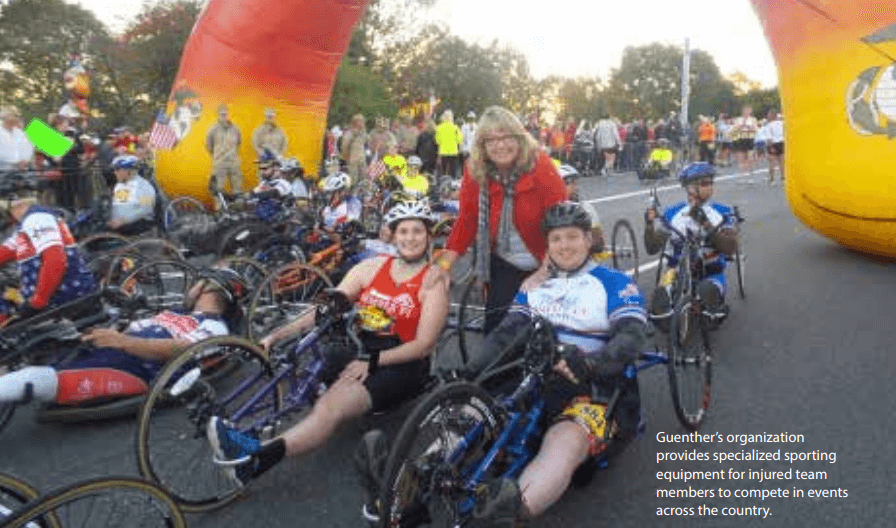One military spouse fulfills a need for returning service members.
When wars began in Iraq and Afghanistan, no one forecasted what to expect from service members returning to American soil — or, what overwhelming price would be paid by those answering that call.
The military community soon realized that when troops came home, combat would linger in their lives through physical, emotional and mental effects. Those realities would rally onlookers, like Karen Guenther, founder of Semper Fi Fund — an organization providing immediate financial assistance and lifetime support to post-9/11 wounded, critically ill and injured members of all branches of the U.S. Armed Forces, and their families, to seek out a way to assist going forward.
“… I was seeing firsthand that the service members who were returning had needs that had to be met in order for them to do the best they could during recovery, and to thrive once they left the hospital and went back into their homes and communities,” Guenther said. “I look back today, and I suppose I was kind of naïve — I thought we’d help a little bit, do our thing, then go back to our day jobs. A dozen years later, it is our day job.”
The thought behind Semper Fi Fund was born out of military spouses reacting to a need. In 2003, Guenther watched the first wave of homecomings from Operation Iraqi Freedom. She joined a group of military spouses in planning homecoming activities. It was evident that those wounded Marines and sailors returning faced unimaginable hardships.
“I had no idea at the time that there was so much work to be done, but the more we did this, the more we saw how much work there was, and the more we figured out how to help,” she said. “And even though the issues affecting our post-9/11 veterans may have faded from the headlines, their needs remain — and in many cases, when we talk about things like integration into the community, lingering effects of PTSD, caregiving for chronic injuries and other long-term issues — those needs actually continue to grow as more service members come home and reintegrate into their communities.”
Guenther, who has a background in nursing, had no formal experience in the nonprofit sector or in business. She read as many relevant books as she could and married that with an “intense desire to make our service organization strong, relevant, and sustainable.”
Near the onset of the organization’s founding, Guenther received a letter from one of the families they helped and it gave her a greater understanding of exactly what the organization’s focus should be — and would be.
“My ah-ha moment came very early on. In those first days, we were distributing snacks and toiletries at hospitals, but the first truly substantive assistance we made was an adaptive van for a catastrophically injured Marine. Shortly after the van was delivered, I received a deeply personal and heartfelt note that expressed how much it meant to him and his family,” she said. “It probably wouldn’t surprise you if I told you the note brought me to tears, and while you could call it an ah-ha moment, it was really more of a moment that said to me, ‘This is what the Semper Fi Fund should be doing much, much more of. This is the way we want to impact the lives of our service members and their families.’”
Even as the coverage of the ongoing wars dim into the background, the quality of life fight for those injured in those conflicts continues long after the return and reintegration. Since 2004, Semper Fi Fund has assisted over 17,500 military members and their families with grants and programs, including adaptive equipment, housing support, education and career transition assistance, and therapeutic arts. Connection with the organization becomes a lifelong relationship, what Guenther refers to as a family.
Semper Fi Fund ‘there for service members’
“We are there for service members and their families at a critical time in their lives, but also for the rest of their lives, if necessary. That’s part of our mission, and our team of staff members and volunteers has been able to fulfill that mission since 2004 in ways I could never have imagined and still can’t believe,” she said. “We look at everyone we assist as family, but we also look at each other as family. We laugh together, we cry together, we serve together.
“I’ll tell you a little secret, and this may sound corny, but it’s absolutely true: If you’re feeling down, if you’re feeling like you need a boost of energy, if you need something to help you overcome some trouble or issue in your own life? Reach out and help someone else. They say laughter is the best medicine, and I agree it’s pretty good, but as far as I’m concerned, charity is the best medicine,” Guenther added.

